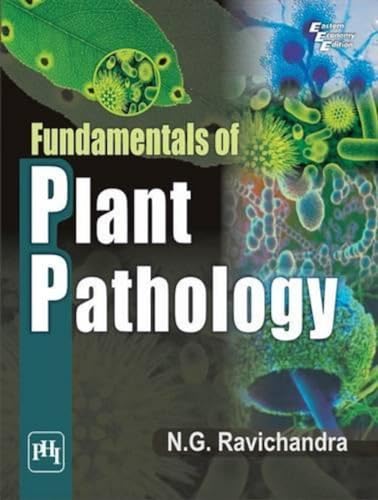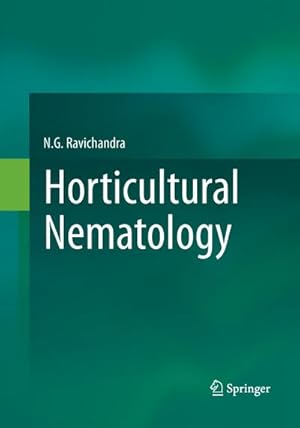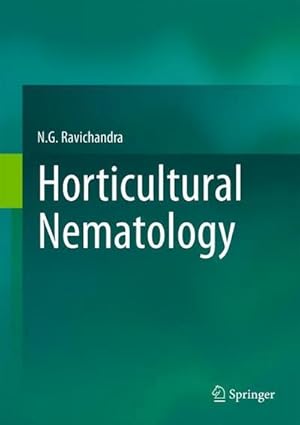N G RAVICHANDRA (3 Ergebnisse)
Produktart
- Alle Produktarten
- Bücher (3)
- Magazine & Zeitschriften
- Comics
- Noten
- Kunst, Grafik & Poster
- Fotografien
- Karten
-
Manuskripte &
Papierantiquitäten
Zustand
- Alle
- Neu
- Antiquarisch/Gebraucht
Einband
Weitere Eigenschaften
- Erstausgabe
- Signiert
- Schutzumschlag
- Angebotsfoto (2)
Land des Verkäufers
Verkäuferbewertung
-
Fundamentals of Plant Pathology
Verlag: PHI Learning 2013-07-30, Delhi, 2013
ISBN 10: 812034703XISBN 13: 9788120347038
Anbieter: Blackwell's, London, Vereinigtes Königreich
Buch
paperback. Zustand: New. Language: ENG.
-
Horticultural Nematology
Verlag: Springer India, 2016
ISBN 10: 8132229622ISBN 13: 9788132229629
Anbieter: AHA-BUCH GmbH, Einbeck, Deutschland
Buch
Taschenbuch. Zustand: Neu. Druck auf Anfrage Neuware - Printed after ordering - The major objective of this book is to highlight the significance of phytonematodes in horticulture. Detailed and latest information on major aspects of phytonematodes associated exclusively with horticultural crops, which is the need of the day, is lacking. Hence, the book has been written mainly with the objective of providing its readers, comprehensive information on the advanced aspects related to phytonematodes associated with horticultural crops. It also provides basic information on plant parasitic nematodes since it is required for a better understanding of advanced topics. Several popular topics, information on which is already available in plenty, have been avoided. Thus, book explicates both the essential fundamental and advanced aspects pertaining to nematodes associated with horticultural crops.The book is conveniently divided into 13 chapters, which cover latest information on the major fundamental and advanced aspects related to phytonematodes including the role of phytonematodes in horticultural industry, phylogenetic and evolutionary concepts in nematodes, major phytonematodes associated with horticultural crops and their diagnostic keys, symptoms caused by phytonematodes and disease diagnosis, nematode population threshold levels, crop loss assessment, nematode diseases of horticultural crops and their management, nematode disease complexes, genetics of nematode parasitism, important nematological techniques and nematodes of quarantine importance. An exclusive chapter on novel methods of nematode management has been included mainly to provide the information on the latest molecules and novel modes of managing nematodes attacking horticultural crops. Routine nematode management aspects, information on which is already available, have not been discussed; instead, this topic reflects the changing scenario of future nematode management.Hence, this book can serve as a friendly guide to meet the requirements of the students, teachersand researchers interested in these 'hidden enemies' of the grower, apart from the research and extension personnel working under Public organizations, officials of State departments of Horticulture, Forestry, field workers and all those concerned and working with plant parasitic nematodes. Appropriate diagrams, convincing tables and suitable graphs/illustrations have been furnished at right places. A complete bibliography has also been included.
-
Horticultural Nematology
Verlag: Springer India, 2014
ISBN 10: 813221840XISBN 13: 9788132218401
Anbieter: AHA-BUCH GmbH, Einbeck, Deutschland
Buch
Buch. Zustand: Neu. Druck auf Anfrage Neuware - Printed after ordering - The major objective of this book is to highlight the significance of phytonematodes in horticulture. Detailed and latest information on major aspects of phytonematodes associated exclusively with horticultural crops, which is the need of the day, is lacking. Hence, the book has been written mainly with the objective of providing its readers, comprehensive information on the advanced aspects related to phytonematodes associated with horticultural crops. It also provides basic information on plant parasitic nematodes since it is required for a better understanding of advanced topics. Several popular topics, information on which is already available in plenty, have been avoided. Thus, book explicates both the essential fundamental and advanced aspects pertaining to nematodes associated with horticultural crops.The book is conveniently divided into 13 chapters, which cover latest information on the major fundamental and advanced aspects related to phytonematodes including the role of phytonematodes in horticultural industry, phylogenetic and evolutionary concepts in nematodes, major phytonematodes associated with horticultural crops and their diagnostic keys, symptoms caused by phytonematodes and disease diagnosis, nematode population threshold levels, crop loss assessment, nematode diseases of horticultural crops and their management, nematode disease complexes, genetics of nematode parasitism, important nematological techniques and nematodes of quarantine importance. An exclusive chapter on novel methods of nematode management has been included mainly to provide the information on the latest molecules and novel modes of managing nematodes attacking horticultural crops. Routine nematode management aspects, information on which is already available, have not been discussed; instead, this topic reflects the changing scenario of future nematode management.Hence, this book can serve as a friendly guide to meet the requirements of the students, teachersand researchers interested in these 'hidden enemies' of the grower, apart from the research and extension personnel working under Public organizations, officials of State departments of Horticulture, Forestry, field workers and all those concerned and working with plant parasitic nematodes. Appropriate diagrams, convincing tables and suitable graphs/illustrations have been furnished at right places. A complete bibliography has also been included.




